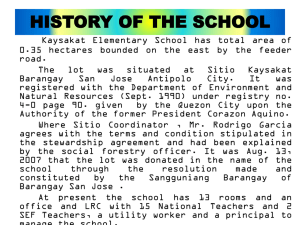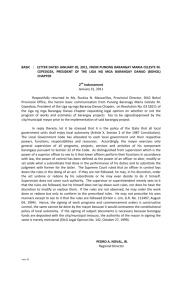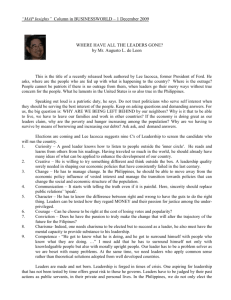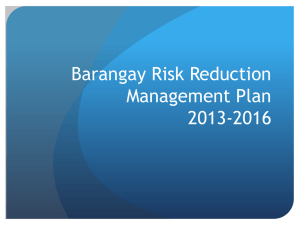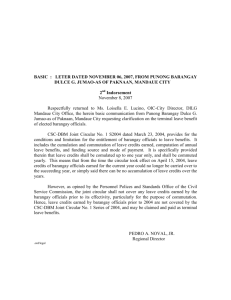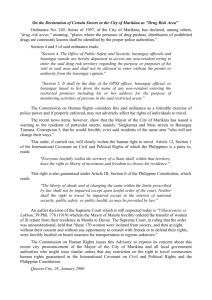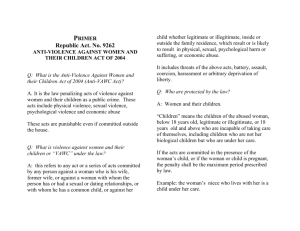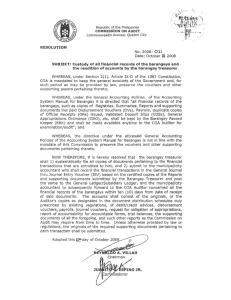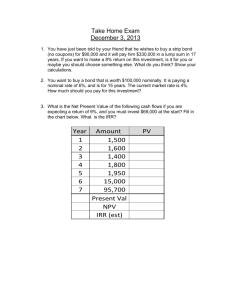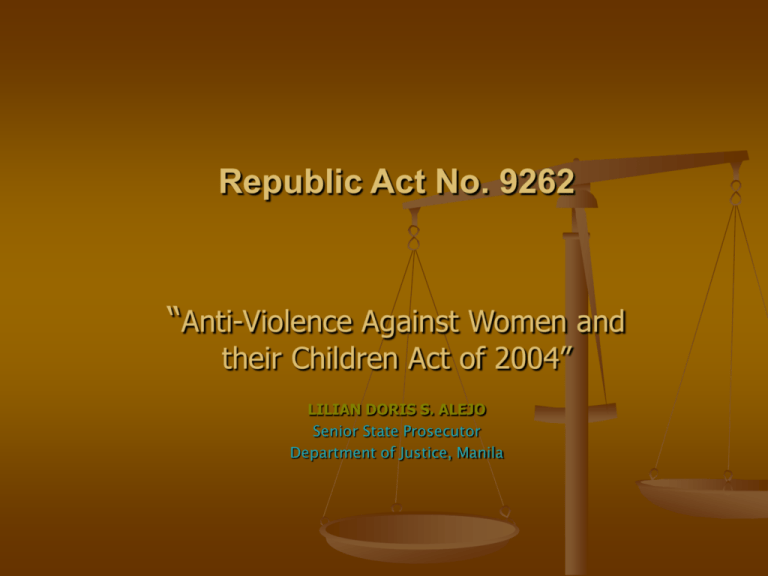
Republic Act No. 9262
“Anti-Violence Against Women and
their Children Act of 2004”
LILIAN DORIS S. ALEJO
Senior State Prosecutor
Department of Justice, Manila
Scope:
1.
Women
VS.
2. Their children
Husbands
Former husbands
Boyfriends/partners
Those whom they have
a common child
Has or had sexual or
dating relationship
legitimate
Illegitimate
Children under her care or
custody
-within or without the family
abode
Acts Punishable:
I.
II.
III.
IV.
Physical Violence
Sexual Violence
Psychological Violence
Economic Abuse
PHYSICAL VIOLENCE
Physical Injuries
SEXUAL VIOLENCE
-Any act which is sexual in nature committed
against a woman or her child
- Includes rape,*(N.B. see Section 5 [g])sexual
harassment, acts of lasciviousness, treating a
woman or her child as a sex object, etc.
PSYCHOLOGICAL VIOLENCE
1.
2.
3.
4.
Acts or omissions causing or likely to cause
mental or emotional suffering including:
Stalking
Damage to property
Repeated verbal abuse
Marital infidelity
ECONOMIC ABUSE
1.
2.
3.
4.
5.
Acts that make or attempt to make a woman
financially dependent
Includes:
Withdrawal of financial support
Preventing her from engaging in a legitimate
profession, business or activity
Deprivation or threat of deprivation of financial
resources
Destroying household property
Controlling victim’s own money or properties
VIOLENCE AGAINST WOMEN AND THEIR
CHILDREN
Any act or a series of acts by any person
against the woman covered by this Act
which result in or is likely to result in
physical, sexual, psychological harm or
suffering or economic abuse including
threats of such acts, battery, assault,
coercion,
harassment
or
arbitrary
deprivation of liberty.
Acts of Violence Against Women & their
Children
Causing physical harm to the woman or
her child;
Threatening to cause the woman or her
child physical harm;
Attempting to cause the woman or her
child physical harm;
Placing the woman or her child in fear of
imminent physical harm;
Attempting to compel or compelling the
woman or her child to engage in conduct
which the woman or her child has the right to
desist from or to desist from conduct which
the woman or her child has the right to
engage in, or attempting to restrict or
restricting the woman’s or her child’s freedom
of movement or conduct by force or threat of
force, physical or other harm or threat of
physical or other harm, or intimidation
directed against the woman or her child.
This shall include, but not limited to, the
following acts committed with the purpose
or effect of controlling or restricting the
woman’s or her child’s movement or
conduct:
1. Threatening to deprive or actually depriving
the woman or her child of custody or access
to her/his family;
2. Depriving or threatening to deprive the
woman or her children of financial support
legally due her or her family, or deliberately
providing the woman’s children insufficient
financial support;
3. Depriving or threatening to deprive the
woman or her child of a legal right;
4. Preventing the woman in engaging in any
legitimate
profession,
occupation,
business or activity, or controlling the
victim’s own money or properties, or
solely controlling the conjugal or common
money, or properties;
Inflicting or threatening to inflict physical
harm on oneself for the purpose of
controlling her actions or decisions;
Causing or attempting to cause the woman
or her child to engage in any sexual activity
which does not constitute rape, by force or
threat of force, physical harm, or through
intimidation directed against the woman or
her child or her/his immediate family.
Engaging in purposeful, knowing, or
reckless conduct, personally or through
another, that alarms or causes substantial
emotional or psychological distress to the
woman or her child. This shall include,
but not be limited to, the following acts:
1. Stalking or following the woman or her
child in public or private places;
2. Peering in the window or lingering outside
the residence of the woman or her child;
3. Entering or remaining in the dwelling or on
the property of the woman or her child
against her/his will;
4. Destroying the property and personal
belongings or inflicting harm to animals or
pets of the woman or her child; and
5. Engaging in any form of harassment or
violence.
Causing mental or emotional anguish,
public ridicule or humiliation to the woman
or her child, including, but not limited to,
repeated verbal and emotional abuse, and
denial of financial support or custody of
minor children or denial of access to the
woman’s child/children.
Reliefs Given:
Protection Orders
1. Barangay Protection Order
2.Temporary Protection Order
3. Permanent Protection Order
Battered Women Syndrome--women found
with BWS do not incur criminal liability
Protective custody of the abused child by the
DSWD even in the absence of PO (IRR)
PROTECTION ORDERS
- An order issued for the purpose of
preventing further acts of violence against
a woman or her child and granting other
necessary relief.
- Purpose: to safeguard the victim from
further harm, minimizing any disruption in
the victim’s daily life and facilitating the
opportunity and ability of the victim to
independently regain control over her life.
PROTECTION ORDERS
Prohibition from threatening or committing,
personally or through another any acts in
Section 5.
Prohibition
from
harassing,
telephoning,
contacting the petitioner
Removal and exclusion from the residence
regardless of ownership, temporarily or
permanently where no property rights are
violated.
Stay away from petitioner, any designated
family or household member, from residence,
school, workplace or specified place.
Directing law enforcer to accompany
petitioner to the residence, ensure
possession of automobile and other
personal effects; supervise respondent’s
removal of belongings
Temporary or permanent custody of child
Support - automatic remittance of salary or
income by employer
Prohibition of the respondent from any use
or possession of a firearm or deadly
weapon; surrender the same to court;
revocation of license; disqualification to
apply for any license
Directing DSWD or appropriate agency
to provide shelter and social services.
Provision of other forms of relief as
the court deems necessary
Restitution for actual damages caused
by the violence
HOW TO APPLY FOR A
PROTECTION ORDER
Must be in writing, signed and verified
under oath by the applicant
Shall contain:
Names and addresses of petitioner and
respondent
Description of relationship between
petitioner and respondent
Statement of the circumstances of the abuse
Description of the reliefs requested by petitioner
Request for counsel and reasons for such
Request for waiver of application fees until
hearing
An attestation that there is no pending
application for a protection order in another
court
If applicant not the victim-survivor--- application
with affidavit attesting to the circumstances of
abuse suffered and circumstances of consent
given by victim-survivor
Will also include information if
disclosure of address of victim-survivor
will pose damage to her life but
applicant will attest that victim-survivor
resides in the municipality or city over
which court has territorial jurisdiction
*see format prepared by the Supreme Court
Who May File for Protection Orders
Offended Party
Parents or guardians
Ascendants, descendants, collateral relatives within 4th
degree of consanguinity or affinity
Social workers of DSWD or LGUs
Police Officers
Punong Barangay or kagawad
Lawyer, counselor, therapist, healthcare provider
At least 2 citizens of the city or municipality who have
personal knowledge of the offense.
WHERE?
-RTC, MTC MCTC with territorial jurisdiction over the
place of residence of the petitioner, except if there is
family court
Barangay Protection Order
Issued by Punong Barangay (PB) ex parte
Effective for 15 days only
Ordering perpetrator to desist from
committing physical harm or threatening
the woman or her child
Prohibiting perpetrator from harassing,
annoying, telephoning, contacting or
otherwise communicating with the victim
survivor, directly or indirectly (IRR)
Kagawad can issue if Punong Barangay
(PB) is not available but must include
attestation that the Punong Barangay is
unavailable at the time of the issuance of
the BPO
Punong Barangay or kagawad, law
enforcers and other government agencies
shall not mediate or conciliate or influence
the
victim-survivor/petitioner
on
a
protection order to compromise or
abandon the relief sought (IRR)
Personal service of the BPO by the
Punong
Barangay
or
Barangay
Kagawad or any brgy. Official (IRR)
BPO deemed served by receipt by
respondent or any adult who received
at the address of respondent (IRR)
Refusal to receive BPO: leave copy of
the BPO at the said address in
presence of two (2) witnesses (IRR)
Server of the BPO will issue certification re
manner, place, date of service including
reasons why the BPO remain unserved
(IRR)
BPO issued free of charge (IRR)
PB or Brgy. Kagawad shall assist in the
filing of the TPO or PPO with the nearest
court in the place of residence of petitioner
(IRR)
Barangay shall ensure transportation and
other expenses for indigent petitioner
(IRR)
BP or Kagawad or Barangay Secretary
shall record all BPOs in a logbook
specifically for VAWCs which shall be
kept confidential form the public
especially the media (IRR)
Shall submit quarterly report of all BPOs
issued to the local office of the DILG
which shall submit summary report of
the BPOs issued to the Secretariat of
the IAC VAWC (IRR)
Enforceable within the barangay (IRR)
Shall furnish a copy of all the BPOs to
the PNP Women’s and Children’s Desk
which shall enter the same in a logbook
(IRR)
Violation of the BPO--- filed with the
MTC, MeTC, MCTC which has territorial
jurisdiction of the barangay which
issued the BPO
Primary responsibility of barangay officials (PB or
Kagawad) to initiate complaints for violation of
BPOs (IRR)
Refusal of PB or Kagawad to file complaint for
violation of a BPO, victim shall file complaint and
admin., civil, criminal action vs. barangay official
concerned
Protection order shall include the following
statement printed in bold-faced type or capital
letters:
“VIOLATION OF THIS ORDER IS PUNISHABLE”
Priority over all other cases
Failure to act---administrative liability
Temporary Protection Order
Issued by the court on the day of filing
Ex parte
Priority over all other cases
Effective for 30 days; extendible
Enforceable anywhere in the Philippines
Violation: fine of P5,000 to P50,000 and/or
imprisonment of six (6) months
Permanent Protection Order
Issued after notice and hearing
Priority over all other proceedings (such as
election cases, habeas corpus etc.)
Effective until revoked by the court upon
application of the person whose favor the
order was issued
Enforceable anywhere in the Philippines
Violation: P5,000 to P50,000 and/or
imprisonment of six (6) months
Violation shall constitute contempt of court
Public Crime
Any
citizen
having
personal
knowledge of the circumstances of
the offense may file a case
Battered Woman Syndrome (BWS)
BWS-scientifically defined pattern of psychological
and behavioral symptoms found in women living in
battering relationships as a result of cumulative
abuse.
Victim with BWS do not incur criminal liability or
civil liability;
A victim with BWS is not disqualified from having
custody of her children
Perpetrator of woman with BWS shall not have
custody
Court
shall
be
assisted
by
expert
psychiatrists/psychologists in the determination of
the state of mind of victim-survivor
People vs. Marivic Genosa (G.R. No.
135981, September 29, 2000)
-self defense arising from the BWS main
points: “ First, each of the phases of
the cycle of violence must be proven to
have characterized at least two
battering
episodes
between
the
appellant and her intimate partner
Second, the final acute battering episode
preceding the killing of the batterer must
have produced in the battered person’s mind
an actual fear of an imminent harm from her
batterer and an honest belief that she needed
to use force in order to save her life. Third,
at the time of the killing, the batterer must
have
posed
probable-not
necessarily
immediate and actual—grave harm to the
accused, based on the history if violence
perpetrated by the former against the latter.
Taken together, these circumstances could
satisfy the requisites of self-defense”.
Cycle of Violence
3 Phases:
I.
“Tension-Building Stage”- battering
male engages in minor battering
incidents and verbal abuse while
the woman, beset by fear and
tension, attempts to be placating
and passive as possible in order to
stave off more serious violence;
II.
“Acute Battering Period”- severity of
the abuse and attacks escalate,
usually triggered by an external or
internal event in the life of the
battering male but provocation for
more severe violence is sometimes
provided by the woman who can no
longer tolerate or control her
phase-one anger and anxiety;
III.
“Contrition and loving or the hearts and
flowers phase”- man will often mix his
pleas for forgiveness and protestation of
devotion
with
promises
to
seek
professional help, to stop drinking and to
refrain from further violence. This period
of relative calm may last for a few
months, but in a battering relationship,
the affection and contrition will eventually
fade and phase one of the cycle will start
anew”.
________
*L.E. Walker, the Battered Woman Syndrome; State vs. Kelly (478 A 2d 364, 371 NJ 1984)
-paper presented in Philja Seminar by Professor Myrra S. Feliciano of the University of the Philippines
Duties of Prosecutors/Court Personnel
Communicate with the victim in a
language understood by the woman
or her child; and
Inform the victim of her/his rights
including legal remedies available and
procedure, and privileges for indigent
litigants.
Duties of Barangay Officials and Law
Enforcers
Enter the dwelling whether or not a P.O.
has been issued
Confiscate deadly weapon in possession or
in plain view
Transport or escort the victim to safe place
or clinic, hospital
Assist victim in removing personal
belongings from the house
DUTIES:
Ensure enforcement of BPO, TPO, PPO
Arrest without a warrant
- When the acts of violence is occurring, or
- When s/he has personal knowledge that abuse
has just been committed, and there is imminent
danger to life and limb of victim
Immediately report the call for assistance
*Failure to report:
-Fine < P10,000.00 or
-Civil, criminal or administrative liability
To Eliminate VAWC, barangay officials shall:
Undertake an education program on
R.A. 9262 i.e., why VAWC exists, rights
and remedies of victim survivors, duties
of residents and all barangay officials
Have
family
violence
prevention
program including peer counseling for
men
Support
organizing
efforts
and
development programs for women in
the community
Prioritize livelihood projects for victimsurvivors
Involve women on planning and
implementation of all programs and
projects in the barangay
Anti-VAWC desk officer who shall
coordinate a 24-hour one-stop help
desk
All barangay officials, health workers,
workers, tanods, nutrition scholars
undergo gender sensitivity seminars
Develop system of documentation and
report of VAWC cases and assistance
program
Prescribe additional guidelines and
standards consistent with R.A. 9262
HANDLING OF VAWC CASES BY
BARANGAY OFFICIALS
Upon receiving information, verify and seek
police assistance
Enter the dwelling whether or not PO was
issued and ensure safety of victim survivors
Interview,
investigate
and
document
testimony; inform victim-survivors of their
rights and remedies; records shall be
confidential; right to privacy respected
Arrest perpetrator observing rules on
warrantless arrests and confiscate any
deadly weapon in the possession of the
perpetrator or within plain view
Escort victim-survivor to the nearest
hospital or available medical facility for
treatment
and
medico-legal
examination; assist in securing medicolegal report
If not arrested, advise perpetrator to leave
the house to prevent violence and to go to
the barangay center, DSWD, LGU or NGO,
church or other groups that provide
counseling
In case victim-survivors are to be placed in
shelters, assist in taking their belongings
and in their transfer
Report incident and refer to the Local Social
Welfare and Development Office of the LGU
and the PNP Women’s and Children’s
Protection Desk within 4 hours from the time
of reporting
If victim-survivor a minor applying for
BPO, assist and refer to NGOs, social
workers for counseling, temporary
shelter and other support services
Monitor respondent’s compliance to
BPO
Ensure the safety and continued
support during the 15-day period
Assist in filing complaint
Ensure that all pertinent documents
forwarded to the law enforcer
Maintain separate logbook which shall be
kept confidential
Not attempt to influence victim-survivors to
abandon claim; arbitration not applicable
counsel & explain to respondent obligation to
support
Failure to report: fine <P10,000.00 or
criminal, civil, administrative liability
Administrative Complaint---Sangguniang
Panglunsod or Bayan for gross neglect of duty
or misfeasance
Duties & Functions of the
PNP-WCPD (IRR)
Investigate i.e., take statement,
collect evidence, etc.
Refer to the nearest PNP crime
laboratory and/or hospital or any
medical facilities for medico-legal
examination; ensure, if possible that
the examining physician must be of
the name gender as the victimsurvivor, esp. in sexual violence cases
Only persons expressly authorized by the
victim survivor shall be allowed by the
WCPD officer inside investigation and
examination room
Ensure confidentiality; maintain separate
blotter for VAWC cases; must not be
accessible to media
Refer to social worker of the LGU, any
available DSWD shelters, NGOs and other
service
providers
for
psychosocial
intervention and other rehabilitation
programs
Forward investigation and all evidence to
the prosecutor
If there are manifestations of BWS
validated by past police records and
witnesses’ testimonies, WCPD officer shall
inform the punong barangay, the local
social worker or the concerned NGOs, local,
professional or civic groups for appropriate
psychiatric and psychological evaluation
which may form part of the evidence to be
presented in court
Assist in the application of PO and enforce
PO
Respondent ASAP by entering dwelling if
necessary
Confiscate weapon/firearm, etc. in plain view
Effect warrant of arrest; effect warrantless
arrests under the rules
Assist in facilitating transfer to a safe place of
choice including removal of personal
belongings
Monitor and follow-up case; maintain
periodic assessment report of all cases
Participate
mechanisms
in
multi-disciplinary
Duties of Healthcare Provider
(physician, nurse, clinician, barangay
health worker, therapist, counselor, etc.)
Properly document victim’s physical, emotional or
psychological injuries;
Properly record victim’s suspicions, observations
and circumstances of the examination or visit;
Automatically provide the victim free of charge a
medical certificate concerning the examination or
visit
Keep records safe and available to victim upon
request;
Provide immediate and adequate notice of rights
and remedies pursuant to R.A. 9262 and services
available to victim
(IRR) MEDICAL ASSISTANCE
By Women and Children Protection Unit
(WCPU) in DOH-retained hospitals or in
coordination with LGUs or other
government health facilities:
Complete
physical
and
mental
examinations
Medical/surgical treatment
Psychological and psychiatric evaluation
and treatment
Hospital confinement when necessary
Referral to specialty hospital
concerned agency as needed
and
other
Manage the reproductive health concerns of
victim-survivors
If necessary, contact the DSWD or social
worker of the LGU for emergency assistance
or to the police women’s & children’s desk
Further, health care providers shall:
Properly document victim-survivors’
complete condition, etc.
Provide medical certificate free of
charge---public hospitals & clinics
Safeguard record and make the same
available upon request at actual cost
Notify
victim-survivors
of
rights,
remedies and services available
Provide emergency care
Duties of Other Government Agencies
and LGUs
Establish programs i.e., education,
information
campaign,
seminars,
symposia in nature, causes, incidence
and consequences of VAWC
Ensure education and training of their
officers and personnel on the
prevention of VAWC
(IRR) The following agencies shall
specifically integrate VAWC issues in
their
strategy
and
program
formulation and implement programs
and services for the prevention and
elimination of VAWC and for the
protection of VAWC victim-survivor:
1. Bureau
of Jail Management and
Penology (BJMP)
2. Commission
on Higher Education
(CHED)
3. Department of National Defense (DND)
4. National Police Commission (NAPOLCOM)
5. National Commission on Indigenous People
(NCIP)
6. National Statistical Coordination Board
(NSCB)
7. Office on Muslim Affairs (OMA)
8. Philippine Information Agency (PIA)
9. Technical Education and Skills Development
Authority (TESDA)
Prohibited Acts
Barangay Official or the court hearing the
application for a P.O. shall not order,
direct, force or in any way influence the
applicant to compromise or abandon any
of the reliefs sought.
No mediation or conciliation of acts of
VAWC in the barangay (Sec 410-413 LGC
amended)
Exemption from Liability
NO CRIMINAL, CIVIL, ADMINISTRATIVE
LIABILITY:
Any person, private individual, police
authority, barangay official acting in
accordance with law, who responds or
intervenes without using violence or
restraint greater than necessary to
ensure safety of the victim.
Location of service provider shall not be
disclosed
Rights of persons arrested shall be
respected
Rights of Victims
Right to be treated with respect and dignity;
Legal assistance from PAO or any public assistance
office; support services from DSWD, LGUs;
To be informed of their rights and services available
including right to apply for protection order;
Additional 10 day paid leave from work aside from
present paid leave benefits;
Certification that action is pending
All legal remedies and support under the Family
Code;
Actual, compensatory, moral & exemplary damages
Exception from payment of docket fee and other
expenses if indigent or there is immediate
necessity.
Counseling & Treatment of Offenders
DSWD
shall
provide
rehabilitative
counseling
and
treatment
of
perpetrators
Constructive ways of coping with anger
and reforming their ways
When necessary, the Court shall order
offender to submit to psychiatric
treatment or confinement
1.
2.
(IRR) DSWD with NGOs and LGUs shall
ensure effective psychosocial rehabilitation
of offender which includes but not limited
to the following:
Development of policies and procedures
relative to the delivery of rehabilitation
services ensuring its effectiveness and
efficiency
Provision of appropriate training to
City/Municipal Social Workers and other
service providers who are implementing
rehabilitative/treatment programs
3.
Establishment
of
system
of
accreditation
of
counselors
and
rehabilitation programs in coordination
with concerned institutions and the
academe for regulatory purposes
Those issued with BPOs or TPOs &
PPOs shall be subject to mandatory,
rehabilitative counseling and treatment
1.
2.
Perpetrators covered by the program:
Referred by the PNP Women and
Children Protection Desks, LGUs,
NGOs, etc.
Referred by concerned citizens or
groups
Confidentiality of Records
Court records and barangay records
Right to privacy of victim
Violation: -contempt power of the court
1 year imprisonment & fine of not more
than P500,000.00
(IRR) Mandatory Services &
Entitlements for VAWC VictimSurvivors
a.
b.
The DSWD and LGUs shall:
Provide emergency shelter, psycho-social
counseling and other rehabilitation services
Ensure
that
service
providers
in
institutions/centers for women and children
are gender sensitive and uphold the rights of
women and children
c. Make available relevant skills training and
other livelihood development services
d. Ensure their successful social re-integration
and after-care
e. Continue to develop relevant programs and
strategies to ensure protection, healing,
recovery and social re-integration and
address their emerging needs and concerns
Inter-Agency Council
DSWD
NCRFW
CSC
CHR
CWC
DOJ
DILG
PNP
DOH
DepEd
DOLE
NBI
IRR Committee
DSWD- Chair
NCRFW-Secretariat
DOJ
DILG
DOH
PNP
Women’s Crisis Center
Women’s Legal Bureau
Kalakasan
THANK YOU.

